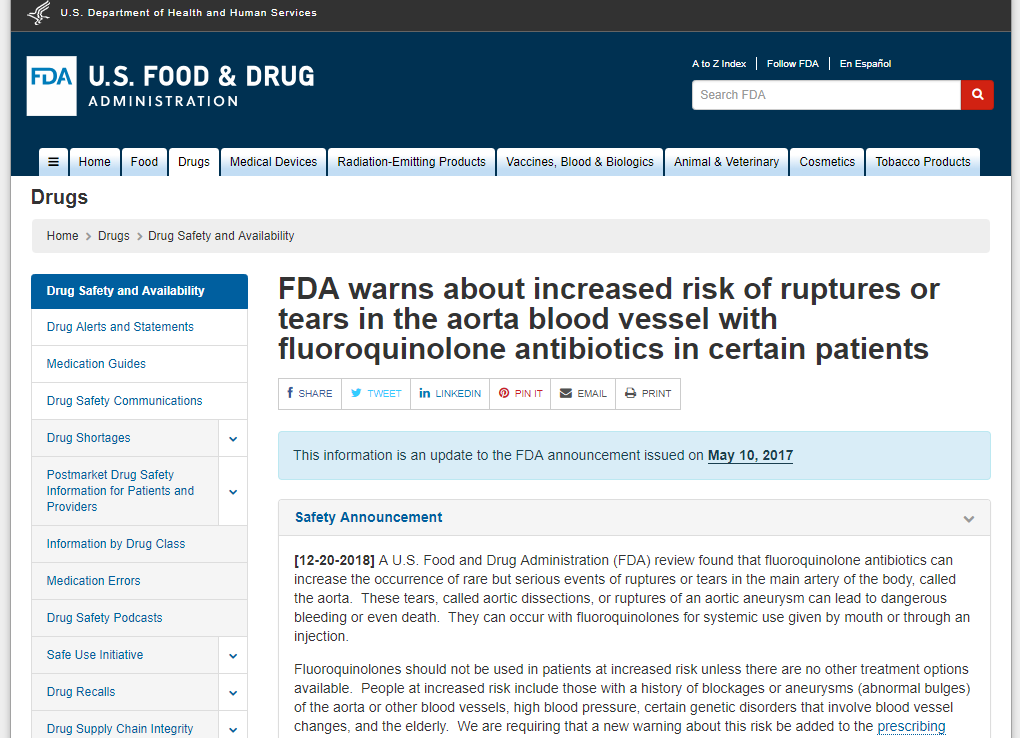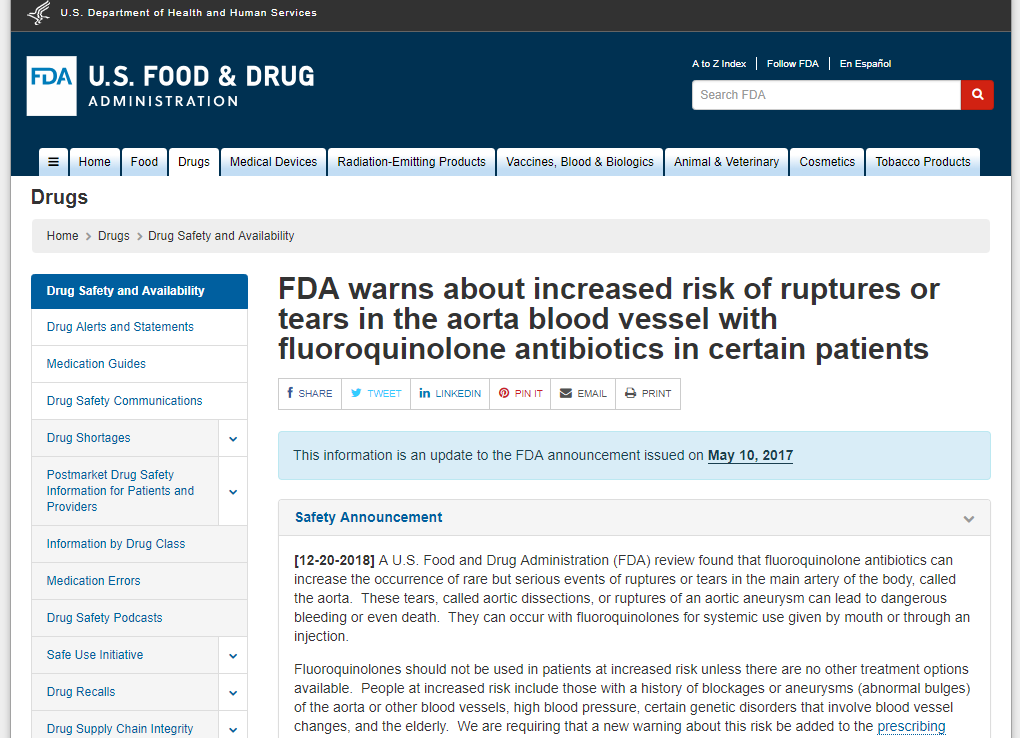On December 20, 2018, the US FDA released a review that “found that fluoroquinolone antibiotics can increase the occurrence of rare but serious events of ruptures or tears in the main artery of the body, called the aorta. These tears, called aortic dissections, or ruptures of an aortic aneurysm can lead to dangerous bleeding or even death. They can occur with fluoroquinolones for systemic use given by mouth or through an injection.” (source)
This acknowledgement from the FDA came three years after two major studies showed a statistically significant increase in risk of aortic dissection and aneurysm with fluoroquinolone use. The studies, “Risk of Aortic Dissection and Aortic Aneurysm in Patients Taking Oral Fluoroquinolone” (JAMA Internal Medicine, 2015), and “Fluoroquinolones and collagen associated severe adverse events: a longitudinal cohort study” (BMJ Open, 2015) both found that fluoroquinolone use is associated with an increased risk of aortic aneurysm and dissection, with “Risk of Aortic Dissection and Aortic Aneurysm in Patients Taking Oral Fluoroquinolone” concluding that:
“Use of fluoroquinolones was associated with an increased risk of aortic aneurysm and dissection. While these were rare events, physicians should be aware of this possible drug safety risk associated with fluoroquinolone therapy.”
Both “Risk of Aortic Dissection and Aortic Aneurysm in Patients Taking Oral Fluoroquinolone” and “Fluoroquinolones and collagen associated severe adverse events: a longitudinal cohort study” are major studies, with “analysis of 1477 case patients and 147 700 matched control cases from Taiwan’s National Health Insurance Research Database (NHIRD) from among 1 million individuals longitudinally observed from January 2000 through December 2011” for the former, and 1.7 million older adults in Ontario, Canada, for the later. They are robust studies that show a statistically significant association between fluoroquinolone-use and aortic aneurysm and dissection.
The FDA took too long to warn the public about the dangers of aortic aneurysm and dissection post exposure to fluoroquinolones, but, better late than never. Here is the full text of the FDA announcement that was published on Thursday December 20, 2018:
[12-20-2018] A U.S. Food and Drug Administration (FDA) review found that fluoroquinolone antibiotics can increase the occurrence of rare but serious events of ruptures or tears in the main artery of the body, called the aorta. These tears, called aortic dissections, or ruptures of an aortic aneurysm can lead to dangerous bleeding or even death. They can occur with fluoroquinolones for systemic use given by mouth or through an injection.
Fluoroquinolones should not be used in patients at increased risk unless there are no other treatment options available. People at increased risk include those with a history of blockages or aneurysms (abnormal bulges) of the aorta or other blood vessels, high blood pressure, certain genetic disorders that involve blood vessel changes, and the elderly. We are requiring that a new warning about this risk be added to the prescribing information and patient Medication Guide for all fluoroquinolones.
Fluoroquinolone antibiotics are approved to treat certain bacterial infections and have been used for more than 30 years. They work by killing or stopping the growth of bacteria that can cause illness. Without treatment, some infections can spread and lead to serious health problems (see List of Currently Available FDA-Approved Systemic Fluoroquinolones).
Health care professionals should avoid prescribing fluoroquinolone antibiotics to patients who have an aortic aneurysm or are at risk for an aortic aneurysm, such as patients with peripheral atherosclerotic vascular diseases, hypertension, certain genetic conditions such as Marfan syndrome and Ehlers-Danlos syndrome, and elderly patients. Prescribe fluoroquinolones to these patients only when no other treatment options are available. Advise all patients to seek immediate medical treatment for any symptoms associated with aortic aneurysm. Stop fluoroquinolone treatment immediately if a patient reports side effects suggestive of aortic aneurysm or dissection.
Patients should seek medical attention immediately by going to an emergency room or calling 911 if you experience sudden, severe, and constant pain in the stomach, chest or back. Be aware that symptoms of an aortic aneurysm often do not show up until the aneurysm becomes large or bursts, so report any unusual side effects from taking fluoroquinolones to your health care professional immediately. Before starting an antibiotic prescription, inform your health care professional if you have a history of aneurysms, blockages or hardening of the arteries, high blood pressure, or genetic conditions such as Marfan syndrome or Ehlers-Danlos syndrome. If you have been prescribed a fluoroquinolone to treat an infection, do not stop the antibiotic without first talking to your health care professional.
We reviewed cases reported to FDA* and four published observational studies1,2,3,4 that showed an increased risk of aortic aneurysm or dissection associated with fluoroquinolone use (see Data Summary). How some of the studies were designed or carried out, and the ways the data were analyzed could affect the study findings; however, taken together, the results of all four studies provide consistent evidence of an association between fluoroquinolone use and aortic aneurysm or dissection. The underlying mechanism for this risk cannot be determined from these studies, and the background risk of aortic aneurysm can vary depending on the population. The background risk has been estimated from nine aortic aneurysm events per 100,000 people per year in the general population to 300 aortic aneurysm events per 100,000 people per year in individuals at highest risk. Because multiple studies showed higher rates of about twice the risk of aortic aneurysm rupture and dissection in those taking fluoroquinolones, FDA determined the warnings were warranted to alert health care professionals and patients.
We communicated safety information associated with fluoroquinolones in July 2018 (significant decreases in blood sugar and certain mental health side effects), July 2016 (disabling side effects of the tendons, muscles, joints, nerves, and central nervous system), May 2016 (restricting use for certain uncomplicated infections), August 2013 (peripheral neuropathy), and July 2008 (tendinitis and tendon rupture).
To help FDA track safety issues with medicines, we urge patients and health care professionals to report side effects involving fluoroquinolones or other medicines to the FDA MedWatch program, using the information in the “Contact FDA” box at the bottom of the page.
More information about the link between fluoroquinolones and aortic aneurysm and dissection can be found in these studies or articles:
- JAMA Internal Medicine, “Risk of Aortic Dissection and Aortic Aneurysm in Patients Taking Oral Fluoroquinolone“
- BMJ Open, “Fluoroquinolones and collagen associated severe adverse events: a longitudinal cohort study“
- BMJ, “Fluoroquinolone use and risk of aortic aneurysm and dissection: nationwide cohort study“
- Baylor College of Medicine, “Ciprofloxacin increases risk of tears, rupture in mouse aortas“
Additionally, here are some news articles about the FDA acknowledgement of the link between fluoroquinolones and aortic aneurysm and dissection:
- CNN, “Certain antibiotics may cause aortic aneurysm, FDA warns“
- NBC News, “FDA warns some antibiotics can cause fatal heart damage: Drugs commonly used to treat upper respiratory infection, urinary tract infections should not be prescribed to patients already at risk“
- Medscape, “More Fluoroquinolone Safety Concerns“
- WRIC ABC 8 Richmond, “Commonly prescribed antibiotics can cause potentially deadly ruptures, FDA warns”












I had massive acid reflux, tachycardia, and major heart pains right after taking Fluoros, which they quickly dismissed as just something minor in my right ventrical. I didn’t have any problems with my heart before and always wondered if it gave it some kind of damage. I just went in not to long ago again after ridding years of bitternes and discouragement, just to find another heart Doctor dismiss it with no testing at all. Some years back they did the same and there is no record that I went in for that at a certain clinic in. One ER doctor told me that I just needed to go back to work. I’ve been in numerous times and that no-one has ever offered a heart scan to present. I should have done that myself years ago along with going out of my networks. Oh wait I couldn’t afford that since I lost my job over nerve damage. Now that my Wife’s heart is compromised I wonder about our Kids futures. Now I get the same look from doctors every visit as if to say in an obvious manner, I’ll get rid of You buddy! I’ll just say, for people that are good and have always been since young, been changed and back to the good again, I surely understand the feeling of mistreatment. My mountain is slowly being pushed away that Levaquin/Cipro 750s x7 has brought on and please don’t quit. I was to a crawl feeling a slow death hugging me and EVERYTHING is affected permanently. My hope to the afflicted that You find Your “within” and can pull through scratching like I have, and am. It is like being on a roller coaster with a lead suit. Thanks, Floxie Hope. Steve W. and Family.
Doctors choose to remain ignorant of the damage this drug can do. Seven years ago, when trying to get my Celiac diagnosed, a dentist offered me the drug. I told him of how it left my daughter to suffer. He said “she has only half of your genes, I want you to try it.” I said you are willing to cripple me with a 50/50 chance, fuck you. The same thing happened when I recently had cataract surgery. I told them under no circumstances was I to have a fuloquine drug. I received it anyway. My goodness, how many people does it poison with doctors permission?
… [Trackback]
[…] Find More here to that Topic: floxiehope.com/fda-warns-about-increased-risk-of-aortic-aneurysm-and-dissection-with-fluoroquinolone-antibiotics/ […]
… [Trackback]
[…] There you can find 20692 more Info on that Topic: floxiehope.com/fda-warns-about-increased-risk-of-aortic-aneurysm-and-dissection-with-fluoroquinolone-antibiotics/ […]
… [Trackback]
[…] Read More here to that Topic: floxiehope.com/fda-warns-about-increased-risk-of-aortic-aneurysm-and-dissection-with-fluoroquinolone-antibiotics/ […]
… [Trackback]
[…] Find More on on that Topic: floxiehope.com/fda-warns-about-increased-risk-of-aortic-aneurysm-and-dissection-with-fluoroquinolone-antibiotics/ […]
… [Trackback]
[…] Find More Info here to that Topic: floxiehope.com/fda-warns-about-increased-risk-of-aortic-aneurysm-and-dissection-with-fluoroquinolone-antibiotics/ […]
… [Trackback]
[…] Find More to that Topic: floxiehope.com/fda-warns-about-increased-risk-of-aortic-aneurysm-and-dissection-with-fluoroquinolone-antibiotics/ […]
… [Trackback]
[…] Find More here to that Topic: floxiehope.com/fda-warns-about-increased-risk-of-aortic-aneurysm-and-dissection-with-fluoroquinolone-antibiotics/ […]
… [Trackback]
[…] Read More Information here on that Topic: floxiehope.com/fda-warns-about-increased-risk-of-aortic-aneurysm-and-dissection-with-fluoroquinolone-antibiotics/ […]
… [Trackback]
[…] Find More Information here to that Topic: floxiehope.com/fda-warns-about-increased-risk-of-aortic-aneurysm-and-dissection-with-fluoroquinolone-antibiotics/ […]
… [Trackback]
[…] Read More to that Topic: floxiehope.com/fda-warns-about-increased-risk-of-aortic-aneurysm-and-dissection-with-fluoroquinolone-antibiotics/ […]
… [Trackback]
[…] Find More on that Topic: floxiehope.com/fda-warns-about-increased-risk-of-aortic-aneurysm-and-dissection-with-fluoroquinolone-antibiotics/ […]
… [Trackback]
[…] Read More here to that Topic: floxiehope.com/fda-warns-about-increased-risk-of-aortic-aneurysm-and-dissection-with-fluoroquinolone-antibiotics/ […]
… [Trackback]
[…] There you will find 32856 more Information on that Topic: floxiehope.com/fda-warns-about-increased-risk-of-aortic-aneurysm-and-dissection-with-fluoroquinolone-antibiotics/ […]